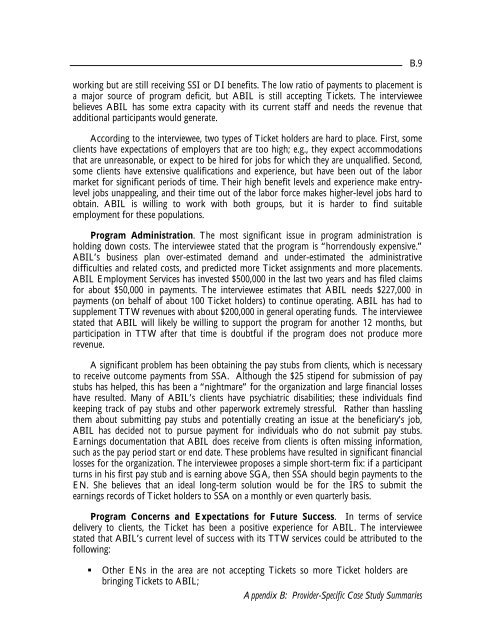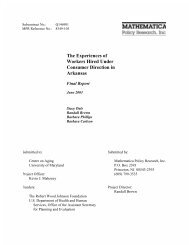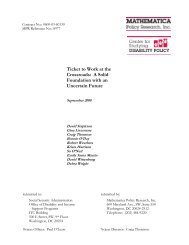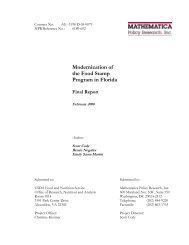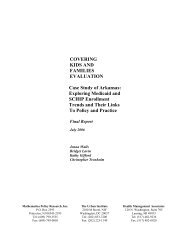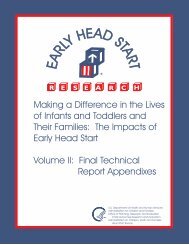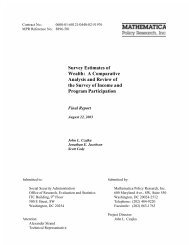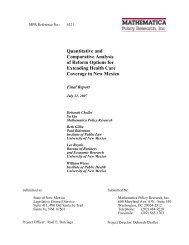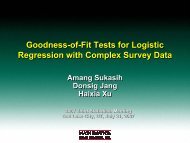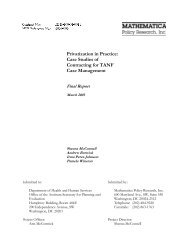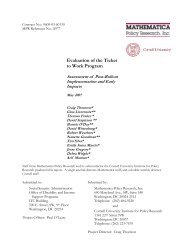Evaluation of the Ticket to Work Program Initial Evaluation Report
Evaluation of the Ticket to Work Program Initial Evaluation Report
Evaluation of the Ticket to Work Program Initial Evaluation Report
Create successful ePaper yourself
Turn your PDF publications into a flip-book with our unique Google optimized e-Paper software.
working but are still receiving SSI or DI benefits. The low ratio <strong>of</strong> payments <strong>to</strong> placement is<br />
a major source <strong>of</strong> program deficit, but ABIL is still accepting <strong>Ticket</strong>s. The interviewee<br />
believes ABIL has some extra capacity with its current staff and needs <strong>the</strong> revenue that<br />
additional participants would generate.<br />
According <strong>to</strong> <strong>the</strong> interviewee, two types <strong>of</strong> <strong>Ticket</strong> holders are hard <strong>to</strong> place. First, some<br />
clients have expectations <strong>of</strong> employers that are <strong>to</strong>o high; e.g., <strong>the</strong>y expect accommodations<br />
that are unreasonable, or expect <strong>to</strong> be hired for jobs for which <strong>the</strong>y are unqualified. Second,<br />
some clients have extensive qualifications and experience, but have been out <strong>of</strong> <strong>the</strong> labor<br />
market for significant periods <strong>of</strong> time. Their high benefit levels and experience make entrylevel<br />
jobs unappealing, and <strong>the</strong>ir time out <strong>of</strong> <strong>the</strong> labor force makes higher-level jobs hard <strong>to</strong><br />
obtain. ABIL is willing <strong>to</strong> work with both groups, but it is harder <strong>to</strong> find suitable<br />
employment for <strong>the</strong>se populations.<br />
<strong>Program</strong> Administration. The most significant issue in program administration is<br />
holding down costs. The interviewee stated that <strong>the</strong> program is “horrendously expensive.”<br />
ABIL’s business plan over-estimated demand and under-estimated <strong>the</strong> administrative<br />
difficulties and related costs, and predicted more <strong>Ticket</strong> assignments and more placements.<br />
ABIL Employment Services has invested $500,000 in <strong>the</strong> last two years and has filed claims<br />
for about $50,000 in payments. The interviewee estimates that ABIL needs $227,000 in<br />
payments (on behalf <strong>of</strong> about 100 <strong>Ticket</strong> holders) <strong>to</strong> continue operating. ABIL has had <strong>to</strong><br />
supplement TTW revenues with about $200,000 in general operating funds. The interviewee<br />
stated that ABIL will likely be willing <strong>to</strong> support <strong>the</strong> program for ano<strong>the</strong>r 12 months, but<br />
participation in TTW after that time is doubtful if <strong>the</strong> program does not produce more<br />
revenue.<br />
A significant problem has been obtaining <strong>the</strong> pay stubs from clients, which is necessary<br />
<strong>to</strong> receive outcome payments from SSA. Although <strong>the</strong> $25 stipend for submission <strong>of</strong> pay<br />
stubs has helped, this has been a “nightmare” for <strong>the</strong> organization and large financial losses<br />
have resulted. Many <strong>of</strong> ABIL’s clients have psychiatric disabilities; <strong>the</strong>se individuals find<br />
keeping track <strong>of</strong> pay stubs and o<strong>the</strong>r paperwork extremely stressful. Ra<strong>the</strong>r than hassling<br />
<strong>the</strong>m about submitting pay stubs and potentially creating an issue at <strong>the</strong> beneficiary’s job,<br />
ABIL has decided not <strong>to</strong> pursue payment for individuals who do not submit pay stubs.<br />
Earnings documentation that ABIL does receive from clients is <strong>of</strong>ten missing information,<br />
such as <strong>the</strong> pay period start or end date. These problems have resulted in significant financial<br />
losses for <strong>the</strong> organization. The interviewee proposes a simple short-term fix: if a participant<br />
turns in his first pay stub and is earning above SGA, <strong>the</strong>n SSA should begin payments <strong>to</strong> <strong>the</strong><br />
EN. She believes that an ideal long-term solution would be for <strong>the</strong> IRS <strong>to</strong> submit <strong>the</strong><br />
earnings records <strong>of</strong> <strong>Ticket</strong> holders <strong>to</strong> SSA on a monthly or even quarterly basis.<br />
<strong>Program</strong> Concerns and Expectations for Future Success. In terms <strong>of</strong> service<br />
delivery <strong>to</strong> clients, <strong>the</strong> <strong>Ticket</strong> has been a positive experience for ABIL. The interviewee<br />
stated that ABIL’s current level <strong>of</strong> success with its TTW services could be attributed <strong>to</strong> <strong>the</strong><br />
following:<br />
! O<strong>the</strong>r ENs in <strong>the</strong> area are not accepting <strong>Ticket</strong>s so more <strong>Ticket</strong> holders are<br />
bringing <strong>Ticket</strong>s <strong>to</strong> ABIL;<br />
B.9<br />
Appendix B: Provider-Specific Case Study Summaries


